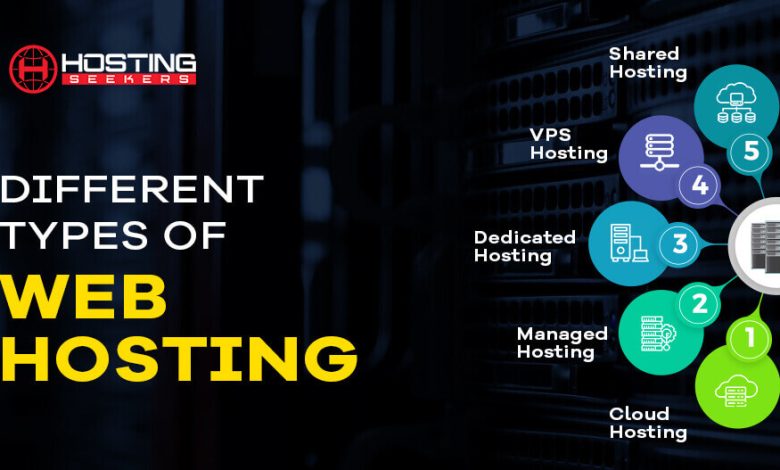Different Types of Web Hosting
Types of Web Hosting and Their Differences

Web hosting is the process of storing your website on a remote server, which allows you to view your site’s content from any computer connected to the Internet. Web hosting typically entails a username, password, and an automatically-assigned IP address. With different types of web hosting services available online, this can be a confusing area to deal with.
The internet is full of options for web hosting. It can be daunting to find the right one.
You have a dilemma, what to do? The answer is simple.
Blindly signing up with a web hosting provider is something you should avoid at all costs. If you want to save time, money, and effort in the future, read this article to learn how to choose the best Web hosting provider for your company.
We’ve put together this fast guide to explain how types of web hosting services work and who they’re best suited for to prevent “apples to oranges” comparisons.
There are five different types of web hosting
Every website is unique. That is why there are about five types of hosting and many servers to satisfy their requirements. A single server may be shared by several websites.
1.Shared Hosting
Shared hosting is the most widely used form of web hosting service. It allows the hosting of multiple websites on a single web server. All sites hosted on a shared server share resources such as RAM, CPU, and Internet access.
Added services includes:
- Free domain name
- Free SSL certificate
- Integrated website builder
- Security and anti-malware scans
- User-friendly control panel (cPanel)
- Auto-backups
Benefits
- Affordable — plans start at only $1/month
- No specific technical knowledge is required
- Out-of-the-box native website management features
- Pre-configured server environment
- Managed server administration and maintenance
2.VPS Hosting
A Virtual Private Server, or VPS Server, is a virtual space that combines several VPS servers into a single computer or network. Each VPS server has its own setup and is identity.
Benefits
- Dedicated server space
- Stability and scalability
- Root access to the server
- Ability to install any software you want/need
- More cheaper.
3.Dedicated Hosting
Dedicated hosting refers to the best web hosting server that is totally dedicated to a single website. Internally or externally, this form of hosting can be implemented as a service. Physical equipment and resources are entirely committed to one account in dedicated server hosting, and the user does not share the space with other accounts or customers.
Benefits
- Non-constrained configuration/customization
- Full-access control over hosting server
- Guaranteed resources availability
- Improved privacy and security
- Stable and predictable website performance
4.Managed Hosting
Managed hosting is a sort of best web hosting in which the service provider manages all of your website’s resources and you don’t have to worry about anything. This form of web hosting is the ideal solution for you if you operate a huge business and don’t have time to manage your website.
Benefits
- Your website will always be lightning fast, and if traffic rises, your service provider staff will be there to help.
- Technical support.
- You will be able to install any program or software that meets your company’s needs.
5.Cloud Hosting
Cloud hosting is a cloud computing service that allows you to host your website or other web services in a virtual server. It’s like a telecommuting job without the commute!
Benefits
- Instant scalability
- Higher uptime
- Access to the latest hardware
- Greater security
- Value-added cloud services
Among Different Types of Web Hosting, What’s Your Pick?
When it comes to choosing a type of web hosting, you should focus on the technical side of things rather than just the price. There are many considerations to keep in mind – from performance, reliability and security to website design and support quality. To help you choose the best hosting package for your business we have created this comprehensive guide on web hosting types.



